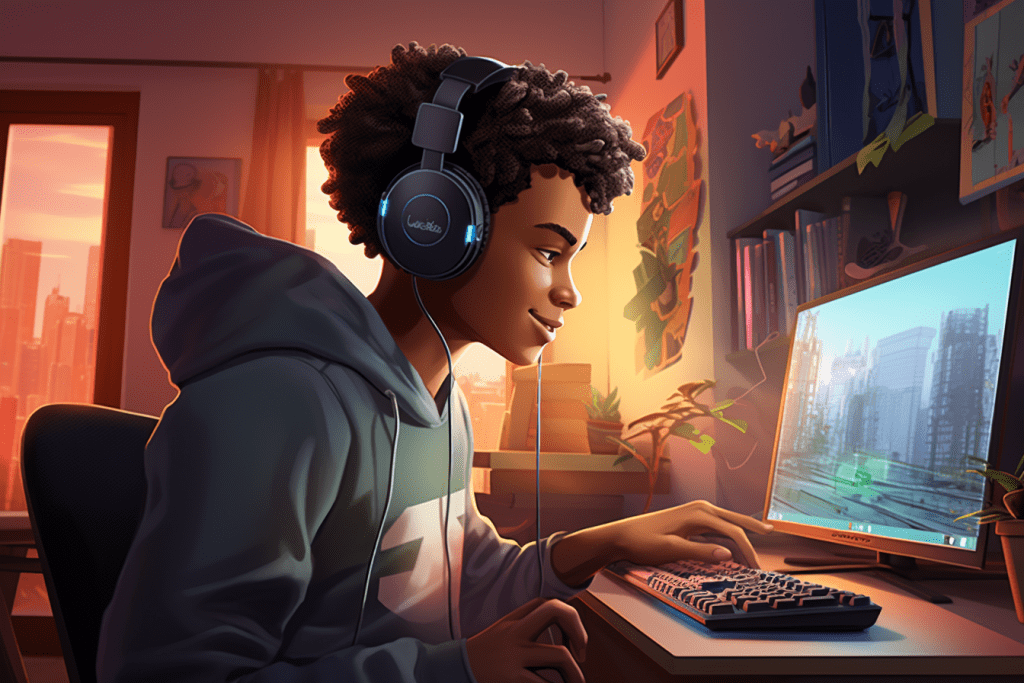Can Video Games Make Students Smarter?
In the rapid evolution of technology, video games have become a pervasive aspect of modern life, capturing the attention of millions worldwide. Beyond mere entertainment tools, video games are increasingly recognized for their potential to improve cognitive abilities. It has led to a pivotal question: Can video games make students smarter?
Cognitive Skills Strengthened by Video Games
Video games are far more than pixels on a screen. They can be an engaging, challenging mental workout with multiple cognitive benefits that extend beyond the virtual world.
Spatial Awareness
In video games, players often need to manipulate objects or navigate through three-dimensional spaces, fostering spatial intelligence. Spatial awareness is the ability to understand and interact with our environment. This skill is vital in numerous academic fields, including geometry, engineering, and architecture, where understanding spatial relations is fundamental.
Problem-Solving and Strategy
Complex games push players to strategize, make rapid decisions, and solve intricate problems to progress. The challenges presented in video games often require players to test multiple hypotheses, analyze situations from different perspectives, and adjust their strategies based on the outcomes. These valuable skills contribute to overall intellectual growth, supporting students in tackling academic challenges and real-world problems.
However, at times, the allure of video games can challenge students, disrupting their focus on academic tasks. In such scenarios, try to solve it in line with paper help review. This reputable writing service can assist in maintaining your academic performance and saving valuable time.
Multitasking and Coordination
Video games, particularly action-packed titles, require simultaneously managing various tasks, fostering multitasking abilities. Players must keep track of their character’s position, the locations of other players, game rules, and more, all while responding swiftly to changes in the game environment. It sharpens their ability to focus on multiple elements without getting overwhelmed.
Moreover, video games improve hand-eye coordination and fine motor skills, as players must synchronize their physical actions with visual information on the screen. It can enhance
performance in activities that require precise coordination, from sports to playing musical instruments.
Video Games and Academic Performance
Video games’ positive effects are not confined to cognitive abilities; they can also influence academic performance. Harnessing their power can revolutionize the learning experience.
Motivation to Learn
The traditional classroom setup may only cater to some students’ learning preferences, reducing engagement and motivation. Video games offer an alternative approach, combining education and entertainment—termed ‘edutainment.’ They make learning more interactive and fun, promoting curiosity and a positive attitude towards learning.
In the context of adult learning and professional development, coworking spaces have emerged as a modern solution for fostering collaboration and continuous learning. These environments unite individuals from various fields and industries, allowing them to work in a shared space.
Skill Application
Interactive video games provide a platform where students can apply and test academic concepts, promoting more profound understanding and retention. For instance, a game based on physics principles can help students grasp these concepts more concretely than textbook learning alone. Such experiential learning can be instrumental in bridging the gap between theoretical knowledge and practical application.
Enhanced Memory
Many games involve tasks that challenge the player’s memory, such as remembering complex sequences or tracking numerous elements. It can improve both short-term and long-term memory, enhancing overall cognitive function. A sharper memory is invaluable to students, aiding the recall of academic concepts and improving exam performance.
Short-term Memory Enhancements
Short-term memory is critical for holding information temporarily during cognitive tasks. Games that require players to remember intricate patterns, clues, or instructions test and train this faculty. This training can translate into real-world applications, such as placing a phone number or recalling details for a test.
Long-term Memory Development
Long-term memory, on the other hand, is responsible for storing information over prolonged periods. Games with storylines, quests, or objectives that unfold over time may challenge and engage long-term memory. Players may need to recall previous events, decisions, or strategies to progress, strengthening their ability to retain information.
Ensuring Balanced Gameplay
While video games can offer significant cognitive benefits, moderation is key. It’s essential to strike a balance and ensure that gaming complements rather than replaces traditional education.
Screen Time Management
Overexposure to screens can lead to physical discomfort, disrupted sleep, and reduced social interaction. Setting a schedule that includes breaks from screen time can help mitigate these risks. Time dedicated to gaming should not interfere with academic responsibilities, physical activities, or social interactions.
But if you still do not have enough time for academic duties, you might want to check if it is PaperHelp reliable to ensure the site’s reliability.
Choosing Educational Games
Not all games are created equal. While some are packed with educational content and cognitive challenges, others offer little educational value. Parents and educators should carefully select age-appropriate games aligned with learning objectives.
Conclusion: The Power of Gaming in Education
Video games hold great potential as educational tools, capable of honing cognitive skills and making learning an engaging experience. However, their use should be balanced and carefully managed to ensure optimal benefits. While video games can make students more intelligent, they are not a silver bullet solution but a supplementary tool in a well-rounded education system.





